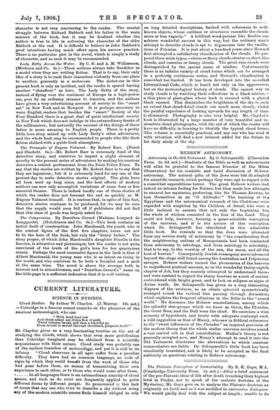HEBREW ASTRONOMY.
Astronomy in the Old Testament. By G. Schiaparelli. (Clarendon Press. 3s. 6d. net.)—Students of the Bible as well as astronomers will alike be grateful to the famous Director of the Milan Observatory for his readable and lucid discussion of Hebrew astronomy. The natural gifts of the Jews were but ill adapted for scientific research, which perhaps they were apt to regard with a somewhat superstitious terror. The great Hebrew writers had indeed an intense feeling for Nature, but they made few attempts to unravel her mysteries, preferring, like Sir Thomas Browne, to lose themselves in an "0 Altitudo !" The learning of the Egyptians and the astronomical research of the Chaldeans were regarded with suspicion by the Children of Israel, who were a little inclined to assume that not only the beginning but the whole of wisdom consisted in the fear of the Lord. They could not help, however, forming a quasi-scientific conception of the universe, and it is the nature of this conception which Dr. Schiaparelli has elucidated in this admirable little book. He reminds us that the Jews were alienated from any serious study of astronomy by "the consideration that the neighbouring nations of Mesopotamia had been conducted from astronomy to astrology, and from astrology to astrolatry, that Is to say, to the worship of the sun, the moon, and all the host of heaven." Consequently Jewish cosmogony never advanced beyond the stage still found among the Australian and Polynesian savages. Hebrew writers turned the phenomena of the heavens to magnificent poetical account, as in the wonderful thirty-eighth chapter of Job, but they scarcely attempted to understand them, and were content to regard the starry heavens as a sort of curtain embroidered with bright gems, and to look on eclipses as signs of divine wrath. Dr. Schiaparelli has given us a very interesting diagram of the universe, as an oblate spheroid symmetrically arranged round the vertical line passing through Jerusalem, which explains the frequent allusions in the Bible to the "round world." He discusses the Hebrew constellations, among which the splendid star-groups which we know as Orion, the Pleiades, the Great Bear, and the Bull were the chief. He exercises a wise economy of hypothesis, and treats with adequate contempt such a wild suggestion as that of Maury, who saw in Biblical references to the "sweet influences of the Pleiades" an inspired prevision of the modern theory that the whole stellar universe revolves round a vast central orb in that constellation. Midler's theory is not generally accepted now, and Maury's attempt to read it into the Old Testament illustrates the aberrations to which amateur commentators are liable. Dr. Schiaparelli's little book has been excellently translated, and is likely to be accepted as the final authority on questions relating to Hebrew astronomy.


















































 Previous page
Previous page